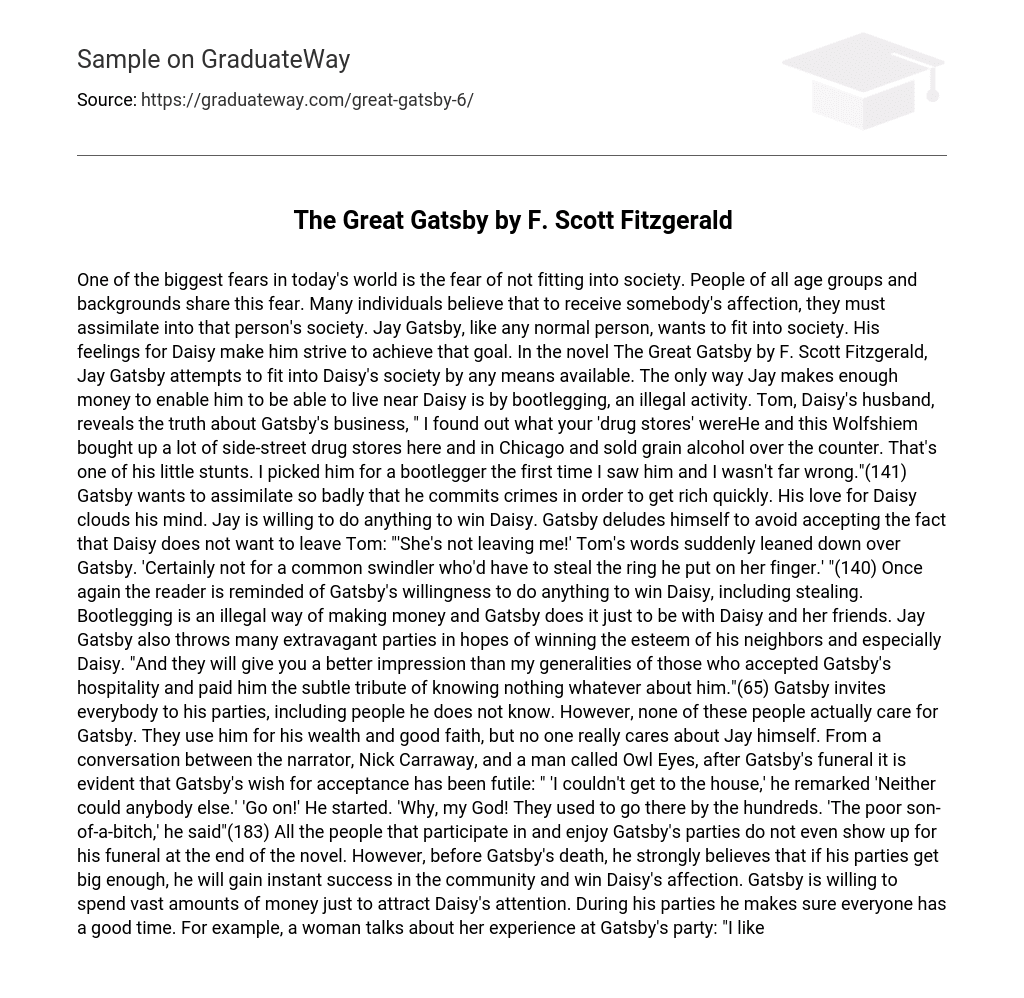One common fear in modern society is the fear of not belonging. This fear is shared by people of all backgrounds and ages. Many believe that in order to gain someone’s acceptance, they must conform to that person’s social circle. Jay Gatsby, as an ordinary individual, also desires to fit into society. His love for Daisy drives him to pursue this objective.
In The Great Gatsby, F. Scott Fitzgerald portrays Jay Gatsby as a character who goes to great lengths to fit into Daisy’s society. He resorts to bootlegging, an illegal activity, as the only means to accumulate enough wealth to reside near Daisy. Tom, Daisy’s husband, exposes Gatsby’s true business ventures, revealing that he and Wolfshiem acquire numerous small pharmacies and sell grain alcohol unlawfully. Gatsby’s intense desire for assimilation leads him to partake in criminal activities, driven by his undeniable love for Daisy. He is willing to do anything to win her over.
Gatsby deceives himself in order to avoid accepting the truth that Daisy does not want to leave Tom. Tom confronts Gatsby, asserting that Daisy would never leave him for a fraudulent man who had to steal the ring he gave her. This scene highlights Gatsby’s desperation to win Daisy’s love, even resorting to theft. Additionally, Gatsby engages in bootlegging, an illegal method of earning money, solely to be with Daisy and her social circle. Furthermore, Gatsby throws lavish parties with the hope of impressing his neighbors and capturing Daisy’s attention. The narrator suggests that attending these parties and interacting with Gatsby’s guests would provide a more accurate understanding of him than vague descriptions of his character.
Gatsby extends invitations to all individuals, even those unfamiliar to him, for his parties. However, these individuals are not genuinely interested in Gatsby himself. Instead, they exploit his wealth and good intentions without truly caring for him. In a conversation between the narrator, Nick Carraway, and a man named Owl Eyes following Gatsby’s funeral, it becomes clear that Gatsby’s desire for acceptance has proven to be in vain: ” ‘I couldn’t get to the house,’ he remarked. ‘Neither could anybody else.’ ‘Go on!’ He was startled. ‘Why, my God! They used to flock there in droves. ‘The poor son-of-a-bitch,’ he stated” (183). None of the individuals who attend and enjoy Gatsby’s extravagant parties bother to attend his funeral towards the end of the novel. However, prior to Gatsby’s demise, he strongly believes that if his parties become grand enough, he will attain immediate success within the community and win Daisy’s affection.
Gatsby goes to extreme lengths to catch Daisy’s eye, even willing to spend enormous sums of money. At his parties, he ensures that everyone has a delightful time. To illustrate, a lady shares her encounter at a Gatsby soirée: “I enjoy attending—I’m never concerned about my actions; thus, I always have a splendid time. On a previous occasion, I accidentally ripped my dress on a chair, and he inquired about my name and address. Within a week, I received a parcel from Croirier’s with a brand-new evening gown enclosed.” (47)
This passage demonstrates Jay’s willingness to spend money recklessly in order to build a strong reputation for himself. Another woman comments, “There’s something peculiar about a man who would do such a thing. He doesn’t want any trouble with anyone” (48). Gatsby is determined to avoid conflicts and maintain positive relationships with everyone. He believes that by throwing extravagant parties, he can attract Daisy’s attention and gain the respect and friendships of his neighbors. Gatsby is prepared to do whatever it takes to appear as a genuine gentleman, even if it means deceiving others about his past and present. Jay tries to conceal his illegal occupation by fabricating stories about his upbringing, stating, “I’ll honestly tell you, I am the offspring of affluent individuals from the Midwest—all deceased now.”
Gatsby deceives others by claiming to have wealthy parents and being educated at Oxford, which he justifies as a family tradition. However, in reality, both of Gatsby’s parents are impoverished. Furthermore, Gatsby hides the fact that he acquired his wealth rapidly and independently, without any assistance from his parents. Additionally, Gatsby fabricates his attendance at Oxford in an attempt to present himself as a refined gentleman. Nick perceives Gatsby’s dishonesty, as indicated by his sideways glance and the knowledge that Jordan Baker believed him to be lying.
Gatsby appeared to rush through, disregard, or struggle with the phrase “educated in Oxford” as if it had troubled him in the past. As a result, his entire statement crumbled, causing me to question if there wasn’t a slight darkness to his character after all.”(69) Gatsby is willing to fabricate the truth in order to portray himself as an educated individual and a genuine gentleman. He believes that by adopting the behavior and mannerisms of Daisy’s social circle, he will be accepted by her and the rest of society. Gatsby’s ideals are tainted by his desperation to fit in with high society.
Jay Gatsby is willing to go to any lengths, including dishonesty and engaging in illegal activities, all because he fears not fitting into Daisy’s society. Like others, he does whatever he thinks will help him belong, regardless of the immoral nature of those actions.





